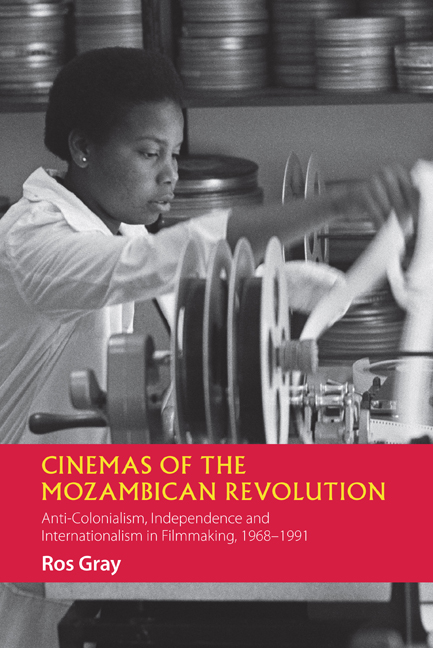 Cinemas of the Mozambican Revolution
Cinemas of the Mozambican Revolution Book contents
- Frontmatter
- Contents
- List of Images
- Acknowledgements
- Glossary
- Abbreviations
- Map of Mozambique
- Introduction
- 1 We Will Win! Filming the Armed Struggle in Mozambique, 1968–1973
- 2 From the Rovuma to the Maputo: Confluences of Independence, 1974–1975
- 3 Birth (of the Image) of a Nation: Delivering Cinema to the People, 1976–1978
- 4 Who Exactly is the Party? Didacticism, the Battle of Information and the Vanguard Party, 1977–1979
- 5 A New Symphony: Cinema and Television in the ‘Decade of Development’, 1980–1984
- 6 Let Them Come! Filmmaking on the Frontline against Apartheid, 1980–1989
- 7 The Time of the Leopards: The End of Socialist Fictions and the Beginnings of the Docu-Drama, 1985–1991
- Conclusion
- Bibliography
- Filmography
- Index
6 - Let Them Come! Filmmaking on the Frontline against Apartheid, 1980–1989
Published online by Cambridge University Press: 16 July 2020
- Frontmatter
- Contents
- List of Images
- Acknowledgements
- Glossary
- Abbreviations
- Map of Mozambique
- Introduction
- 1 We Will Win! Filming the Armed Struggle in Mozambique, 1968–1973
- 2 From the Rovuma to the Maputo: Confluences of Independence, 1974–1975
- 3 Birth (of the Image) of a Nation: Delivering Cinema to the People, 1976–1978
- 4 Who Exactly is the Party? Didacticism, the Battle of Information and the Vanguard Party, 1977–1979
- 5 A New Symphony: Cinema and Television in the ‘Decade of Development’, 1980–1984
- 6 Let Them Come! Filmmaking on the Frontline against Apartheid, 1980–1989
- 7 The Time of the Leopards: The End of Socialist Fictions and the Beginnings of the Docu-Drama, 1985–1991
- Conclusion
- Bibliography
- Filmography
- Index
Summary
This chapter examines Mozambique's role in regional filmmaking collaborations of the 1980s, which sought to make an intervention against South Africa's campaign of destabilisation that targeted the independent nations around its border. It considers how Southern African films such as Pamberi ne Zimbabwe ‘Forward Zimbabwe’ (1981), Fronteiras de Sangue ‘Borders of Blood’ (1986) and Corridors of Freedom (1987) attempted to shift global narratives about the region that privileged the perspectives of white minorities and the former colonial powers. Mozambique and other countries of the region saw themselves as part of a collective ‘frontline’ against Apartheid. The Frontline States alliance was first formally recognised by the Organisation of African Unity in April 1975, following visits by Samora Machel to Zambia and Tanzania during the period of transition to Mozambique's independence (see Chapter 2). These countries, which had supported Frelimo and People's Movement for the Liberation of Angola's (MPLA) armed struggle for independence, recognised the ongoing threat to their national sovereignty posed by the white minority regimes of Rhodesia and South Africa, and that their fates were entangled with the organisations that were resisting them – the ANC in South Africa, SWAPO in Namibia and ZANU and ZAPU in Rhodesia.
Despite independence in Angola, Mozambique and Zimbabwe, South Africa continued to dominate the region economically and had the power to disrupt energy and food supplies across Southern Africa. In response to this situation, the Southern African Development Coordination Conference (SADCC) made up of the state members of Angola, Botswana, Lesotho, Malawi, Mozambique, Swaziland, Tanzania, Zambia and the newly independent Zimbabwe was held to develop economic cooperation (see Chapter 5). The Conferência Africana de Cooperação Cinematográfica that took place in Maputo in 1977 had seen the launch of the Associação Africana de Cooperação Cinematográfica (AACC), which was the first attempt to re-organise the cinema industry at a regional level (see Chapter 3). But in fact little ensued in terms of cinematographic collaboration until 1980, when Zimbabwe gained independence. To understand the significance of this moment for Mozambique and the entire region, it is necessary to make a detour back through the entangled history of resistance to colonial and white minority rule in the Southern African region.
- Type
- Chapter
- Information
- Cinemas of the Mozambican RevolutionAnti-Colonialism, Independence and Internationalism in Filmmaking, 1968–1991, pp. 211 - 234Publisher: Boydell & BrewerPrint publication year: 2020
